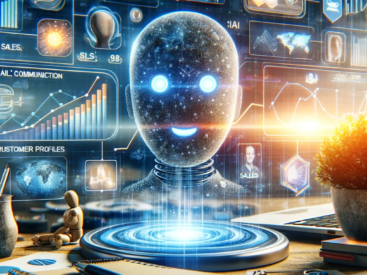Revolutionizing Tech Sales: The Power of Generative AI
Generative AI has emerged as a powerful tool in revolutionizing tech sales. With its ability to generate human-like text, it has transformed the way sales teams interact with customers, create content, and drive conversions. By leveraging generative AI, tech sales professionals can now automate repetitive tasks, personalize customer experiences, and enhance overall sales effectiveness. In this article, we will explore the various ways in which generative AI is transforming tech sales and the immense potential it holds for the future of the industry.
The Role of Generative AI in Transforming Tech Sales
Revolutionizing Tech Sales: The Power of Generative AI
In today’s fast-paced and ever-evolving world, technology sales have become increasingly competitive. Companies are constantly searching for innovative ways to gain a competitive edge and drive revenue growth. One such innovation that is revolutionizing the tech sales landscape is generative artificial intelligence (AI). Generative AI is a powerful tool that is transforming the way companies approach sales, enabling them to better understand customer needs, personalize their offerings, and ultimately close deals more effectively.
At its core, generative AI is a subset of artificial intelligence that focuses on creating new content, such as images, text, or even music, based on patterns and examples it has learned. In the context of tech sales, generative AI can be used to analyze vast amounts of customer data, identify patterns, and generate insights that can inform sales strategies. By leveraging this technology, companies can gain a deeper understanding of their customers’ preferences, pain points, and buying behaviors, allowing them to tailor their sales approach accordingly.
One of the key ways generative AI is transforming tech sales is through its ability to personalize customer interactions. By analyzing customer data, generative AI can identify individual preferences and create personalized recommendations or offers. This level of personalization not only enhances the customer experience but also increases the likelihood of closing a sale. Customers are more likely to engage with a salesperson who understands their unique needs and can offer tailored solutions.
Furthermore, generative AI can also assist sales teams in identifying potential leads and predicting customer behavior. By analyzing historical data, generative AI algorithms can identify patterns that indicate a customer’s likelihood to purchase. This allows sales teams to prioritize their efforts and focus on leads that are most likely to convert, saving time and resources. Additionally, generative AI can help sales teams anticipate customer needs and proactively offer solutions, further enhancing the customer experience and increasing the chances of a successful sale.
Another significant advantage of generative AI in tech sales is its ability to automate repetitive tasks. Sales professionals often spend a significant amount of time on administrative tasks, such as data entry or lead qualification. Generative AI can automate these tasks, freeing up sales teams to focus on more strategic activities, such as building relationships with customers or developing innovative sales strategies. This not only increases productivity but also allows sales professionals to spend more time on activities that directly impact revenue generation.
However, it is important to note that while generative AI offers numerous benefits, it is not a replacement for human sales professionals. The human touch is still crucial in building trust, understanding complex customer needs, and negotiating deals. Generative AI should be seen as a tool that complements and enhances the capabilities of sales teams, rather than replacing them.
In conclusion, generative AI is revolutionizing tech sales by enabling companies to better understand customer needs, personalize their offerings, and automate repetitive tasks. By leveraging the power of generative AI, companies can gain a competitive edge in the fast-paced tech sales landscape. However, it is important to remember that while generative AI is a powerful tool, it should be used in conjunction with human expertise to maximize its potential. As technology continues to advance, the role of generative AI in tech sales will only become more prominent, and companies that embrace this innovation will be well-positioned for success in the future.
Enhancing Sales Strategies with Generative AI Technology
Revolutionizing Tech Sales: The Power of Generative AI
In today’s fast-paced and ever-evolving world, technology sales have become increasingly competitive. Companies are constantly searching for innovative ways to enhance their sales strategies and gain a competitive edge. One such strategy that has gained significant attention is the use of generative AI technology. This cutting-edge technology has the potential to revolutionize the way tech sales are conducted, providing businesses with a powerful tool to drive growth and success.
Generative AI technology, also known as generative adversarial networks (GANs), is a subset of artificial intelligence that focuses on generating new and unique content. Unlike traditional AI systems that rely on pre-existing data, GANs have the ability to create new data by learning from existing data sets. This unique capability makes generative AI an invaluable asset for tech sales teams.
One of the key advantages of generative AI technology in sales is its ability to create personalized content. With the vast amount of information available online, customers have become increasingly discerning and expect personalized experiences. Generative AI can analyze customer data and generate tailored content that resonates with individual customers. This personalized approach not only enhances the customer experience but also increases the likelihood of closing a sale.
Furthermore, generative AI technology can assist sales teams in identifying potential leads and predicting customer behavior. By analyzing large data sets, GANs can identify patterns and trends that may not be immediately apparent to human sales representatives. This valuable insight allows sales teams to target their efforts more effectively, focusing on leads that are most likely to convert into customers. Additionally, generative AI can predict customer behavior, enabling sales teams to anticipate customer needs and provide proactive solutions.
Another significant advantage of generative AI technology is its ability to automate repetitive tasks. Sales teams often spend a significant amount of time on administrative tasks such as data entry and report generation. By leveraging generative AI, these tasks can be automated, freeing up valuable time for sales representatives to focus on building relationships with customers and closing deals. This automation not only increases productivity but also reduces the risk of human error, ensuring accurate and efficient sales processes.
Moreover, generative AI technology can enhance the sales process by providing real-time insights and recommendations. By analyzing customer interactions and feedback, GANs can provide sales representatives with valuable information on customer preferences and pain points. This real-time feedback enables sales teams to adapt their strategies on the fly, ensuring that they are always aligned with customer needs. Additionally, generative AI can provide recommendations on cross-selling and upselling opportunities, maximizing revenue potential.
Despite the numerous benefits of generative AI technology in tech sales, it is important to note that it is not a replacement for human sales representatives. While AI can automate certain tasks and provide valuable insights, the human touch is still crucial in building relationships and understanding complex customer needs. Generative AI should be seen as a powerful tool that complements and enhances the skills of sales teams, rather than a substitute for human interaction.
In conclusion, generative AI technology has the potential to revolutionize tech sales by enhancing sales strategies and driving growth. Its ability to create personalized content, identify potential leads, automate repetitive tasks, and provide real-time insights makes it an invaluable asset for sales teams. However, it is important to remember that generative AI should be used in conjunction with human expertise to ensure a successful sales process. By harnessing the power of generative AI, businesses can stay ahead of the competition and achieve unprecedented success in the ever-evolving world of tech sales.
Leveraging Generative AI for Sales Automation and Efficiency
Revolutionizing Tech Sales: The Power of Generative AI
In today’s fast-paced and highly competitive tech industry, sales teams are constantly seeking innovative ways to streamline their processes and increase efficiency. One such solution that has gained significant traction in recent years is the use of generative artificial intelligence (AI). Leveraging the power of generative AI for sales automation has proven to be a game-changer, enabling companies to optimize their sales strategies and drive revenue growth.
Generative AI, a subset of AI that focuses on creating new content, has the potential to transform the way sales teams operate. By automating repetitive tasks and generating personalized content, generative AI empowers sales professionals to focus on building relationships and closing deals.
One of the key benefits of leveraging generative AI in sales is the automation of lead generation. Traditionally, sales teams spend a significant amount of time and resources identifying potential leads and qualifying them. With generative AI, this process can be automated, allowing sales professionals to access a pool of pre-qualified leads, saving time and effort.
Furthermore, generative AI can assist in creating personalized sales pitches and proposals. By analyzing customer data and preferences, AI algorithms can generate tailored content that resonates with individual prospects. This level of personalization not only enhances the customer experience but also increases the likelihood of closing deals.
Another area where generative AI can revolutionize tech sales is in customer support. AI-powered chatbots can handle routine customer inquiries, providing instant responses and freeing up sales professionals to focus on more complex issues. This not only improves customer satisfaction but also allows sales teams to allocate their resources more efficiently.
Moreover, generative AI can be utilized to optimize pricing strategies. By analyzing market trends, competitor pricing, and customer behavior, AI algorithms can generate pricing recommendations that maximize revenue and profitability. This data-driven approach ensures that sales teams are equipped with the most effective pricing strategies, giving them a competitive edge in the market.
In addition to automation and efficiency, generative AI can also enhance collaboration within sales teams. By analyzing sales data and performance metrics, AI algorithms can identify patterns and provide insights that enable sales professionals to work together more effectively. This collaborative approach fosters knowledge sharing and enables teams to learn from each other’s successes and failures.
However, it is important to note that while generative AI offers immense potential, it is not a substitute for human expertise. Sales professionals still play a crucial role in building relationships, understanding customer needs, and providing personalized solutions. Generative AI should be seen as a tool that complements and enhances their capabilities, rather than replacing them.
In conclusion, the power of generative AI in revolutionizing tech sales cannot be overstated. By automating lead generation, personalizing sales content, optimizing pricing strategies, and enhancing collaboration, generative AI empowers sales teams to operate more efficiently and effectively. However, it is essential to strike a balance between AI automation and human expertise to ensure the best possible outcomes. As the tech industry continues to evolve, embracing generative AI will be key to staying ahead of the competition and driving revenue growth.




